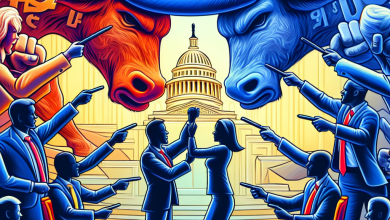Republicans Forge Ahead with Crypto Legislation as Democrats Resist: A Political Showdown in the Blockchain World
Overview
The debate over cryptocurrency regulation in the U.S. Congress is heating up as Democrats clash with Republicans over proposed legislation. House Financial Services Committee ranking member Maxine Waters and subcommittee colleague Stephen Lynch are taking a firm stand against the Republican-led bills set for discussion this week.
Waters has raised concerns about the lack of essential consumer protections in the proposed laws, warning that they could leave the U.S. financial system vulnerable to new risks. She accused Republicans of rushing through legislation that could have far-reaching consequences, calling it a “dangerous package of crypto legislation.”
The legislative package in question consists of three key bills. The GENIUS Act, which focuses on regulating payment stablecoins, has already passed the Senate. The CLARITY Act aims to establish a framework for the digital asset market, while the Anti-CBDC Surveillance State Act seeks to prevent the development of a U.S. government-issued digital currency.
Despite holding a slim majority in the House, Republicans face an uphill battle in garnering enough support to pass all three bills. Democrats are united in their opposition, citing concerns about national security, oversight, and consumer protection.
Stephen Lynch criticized the GOP for prioritizing the interests of the crypto industry over safeguarding consumers. He pointed out the vulnerabilities and potential for abuse within the crypto space that the legislation fails to address adequately.
The debate is further complicated by former President Trump’s ties to the cryptocurrency sector. Reports suggest that Trump’s personal wealth has surged by approximately $620 million, largely due to investments in crypto-related ventures like World Liberty Financial. The firm has even launched its own stablecoin, USD1, raising questions about the intersection of political influence and financial gain.
In conclusion, the clash over cryptocurrency regulation in Congress underscores the complex interplay between industry interests, consumer protection, and national security. As lawmakers navigate these contentious issues, the outcome of this debate will have significant implications for the future of digital assets in the United States.

